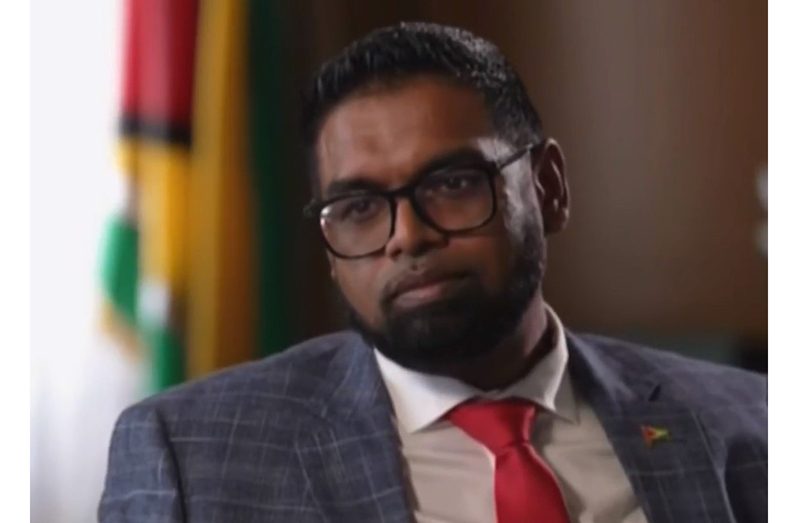–commendations pour in after Head of State’s firm response to ‘global warming’ question
PRESIDENT Irfaan Ali’s interview is now one of the BBC’s top watched interviews so far for the year, with millions of views circulated.
The Head of State has gone viral on social media and has received praises from many for being the voice to call out Western nations on climate change.
This is not the first time President Ali has received such wide-spread attention, as he has been praised worldwide for his positive views by international leaders and has appeared on several international interviews.
President Ali, during an interview on the BBC’s HARDtalk, found himself defending the position of Guyana moving forward with its ambitious plans to tap into its lucrative oil-and-gas reserves and balancing economic growth and environmental stewardship.
Host Stephen Sackur questioned President Ali on whether Guyana’s focus on fossil-fuel extraction contradicts global efforts to combat climate change.
Sackur attempted to lecture the Head of State on climate change, highlighting the potential environmental impact of extracting $150 billion worth of oil-and-gas reserves off Guyana’s coast, pointing to the release of more carbon emissions into the atmosphere.
Responding firmly, President Ali said: “Let me stop you right there. Do you know that Guyana has a forest, forever [sic], that is the size of England and Scotland combined? A forest that stores 19.5 gigatons of carbon? A forest that we have kept alive?”
Sackur further pressed President Ali on whether Guyana’s preservation of its vast forest, which stores a significant amount of carbon, justifies the decision to release carbon emissions through oil and gas extraction.
However, President Ali strategically flipped the script and put the question to the host: “Does that give you the right to lecture us on climate change?” adding: “I am going to lecture you on climate change.”
In challenging critics’ authority to criticise Guyana’s actions, President Ali highlighted Guyana’s environmental stewardship which, he said, justifies its pursuit of oil-and-gas development, while maintaining a net-zero carbon footprint.
Sackur further questioned Guyana’s approach, referencing comments from Vice-President, Dr Bharrat Jagdeo, who emphasised the urgency to extract oil amid the climate change imperative.
President Ali defended this stance as “practical” and “honest,” asserting Guyana’s commitment to economic development and creating opportunities for its people.
He emphasised the country’s need to aggressively pursue its natural resources for economic growth and development, highlighting the lack of external support in bringing opportunities to Guyana.
“You can say we are rushing, but we are very practical. We have this natural resource. And we’re going to aggressively pursue this natural resource because we have to develop our country.
“We are committed to the development of this region.
We have to create opportunities for our people because no one is bringing it out for us,” President Ali said.
The international community has long praised Guyana for its dedication to environmental sustainability and leadership in addressing climate change.
Recently, Ambassador Linda Thomas-Greenfield, the US envoy to the United Nations, acknowledged President Ali’s dedication to environmental priorities, particularly in supporting rural communities and maintaining forest cover.
Meanwhile, the World Bank’s Vice-President for the Latin America and Caribbean Region, Carlos Felipe Jaramillo, has said that the international financial institution is interested in the good learning practices that Guyana has to offer in its efforts to combat the effects of climate change.
Guyana’s commitment is evident in the initiatives aimed at combatting climate change and enhancing economic resilience within the Caribbean Community (CARICOM), as it contributed US$2 million to the Regional Adaptation Fund.
Guyana is also making strides in biodiversity conservation by setting up a state-of-the-art biodiversity centre as part of its Low Carbon Development Strategy (LCDS) 2030. This strategy aims to balance economic growth with environmental preservation.



.jpg)










